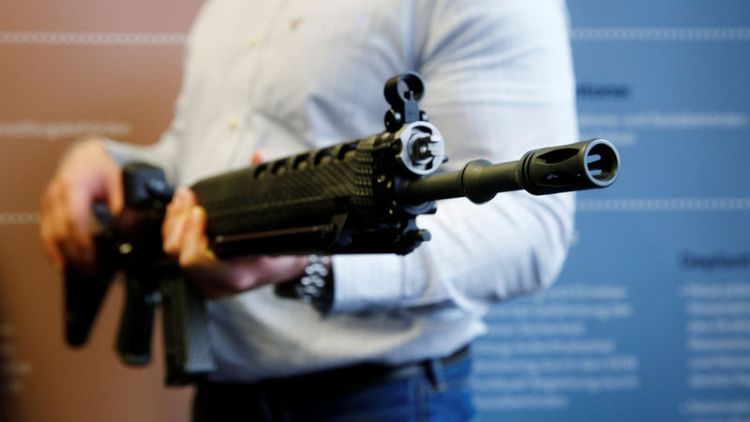By Marina Depetris
ROMONT, Switzerland (Reuters) - Ten years ago, Swiss hairdresser Christine Dousse feared guns. Then her daughter convinced her to join a 400-year-old local shooting club. Now she shoots twice a week.
"When I am lying in the stall, facing the target, alone with my rifle ... I don't know how to describe it, but it just helps me forget a bad day," said the 50-year-old. "It helps me completely let go of the stress and negative things."
Dousse and many of the 500 other participants at a marksmanship contest in Romont this month believe their heritage is under threat from tighter gun rules Swiss voters are expected to support in a binding referendum on Sunday.
Even though Switzerland has one of the highest rates of gun ownership in Europe, polls suggest two out of three voters back controls the European Union embraced in 2017 after militant attacks in Paris and elsewhere.
The new European rules make it harder to buy semi-automatic rifles and easier to track weapons in databases.
Non-EU member Switzerland's parliament and government back the regulations, but shooting enthusiasts fear a dangerous trend towards disarming them altogether.
More is at stake than just guns.
Switzerland must adopt the rules to remain part of Europe's Schengen open-border system, otherwise weapons on the restricted list could reach the EU from Swiss gun shops.
Leaving Schengen would disrupt travel, hurt tourism and crimp cross-border police cooperation, proponents say. Failure to adopt the rules could also force Switzerland out of common rules for handling asylum requests known as the Dublin system.
"They are trying to frighten people into accepting this law, and I find this absolutely ridiculous," Dousse countered during a break in the shooting.
Olivier Curty, a 51-year-old accountant shooting since 12, also decried EU intrusiveness.
"This vote is just a step, and the next step will be the full prohibition of weapons. This is what I can see coming, and even we shooters soon won't be able to keep our weapons at home," he said.
The initial EU proposal provoked an outcry because it meant ending the Swiss tradition of veterans keeping assault rifles after military service. Swiss officials negotiated concessions.
CENTURIES OF TRADITION
Gun rights proponents complain the rules - including requirements to practise shooting regularly - encroach on Switzerland's national identity that includes a well-armed citizenry as a bulwark of national security.
In a nation with nearly 8.5 million inhabitants, gunfire killed just 13 people in 2018, down from 14 in 2017, police data show. Government statistics show 229 people died from gunshot wounds in Switzerland in 2016, of which 212 were suicides.
According to 2017 estimates by the Geneva-based Small Arms Survey, civilians in Switzerland owned 2.3 million guns, or 27.6 firearms per 100 people.
In the United States, by comparison, the population of 326.5 million owned 393.3 million guns, or 120.5 per 100 people.
The 2,600 shooting clubs in Switzerland mean the sound of gunfire from ranges in nearly every village punctuates many weekends. Soldiers travelling with their assault weapons on trains and buses are a common sight.
"Shooting is fun, shooting is a school for life, shooting is for everyone," the national shooting association says on its website. It recommends children start from age eight with air rifles or air pistols, graduating to small-caliber arms at age 10 and army-grade assault weapons at 15.
Shooting contests date to the 14th century, and the image of folk hero William Tell with his crossbow -- used to shoot an apple off his son's head as punishment for defying a Habsburg tyrant -- is ubiquitous. The five-yearly national marksmanship contest is Switzerland's top sporting event.
Zurich comes to a halt when the Swiss financial capital holds its Knabenschiessen ("boys' shooting") sharpshooting festival every September. Despite the name, girls take part too, winning in three of the past seven years.
Guns have a special place for people like retired metalworker Arsene Plomb, 72, whose collection of more than 1,000 weapons includes automatic rifles, submachine guns and semi-automatic pistols that need special permits.
"There was not a single attack done with a legal weapon, not a single one," he said, painting a dark picture of a future Switzerland that has disarmed private citizens.
"In ten, 15, 20 years it will be over, the situation here will be the same as in other European countries which were totally disarmed," he warned. "And this is a problem, because for time immemorial the Swiss citizen has been carrying guns."
(Additional reporting and writing by Michael Shields; Editing by Andrew Cawthorne)


